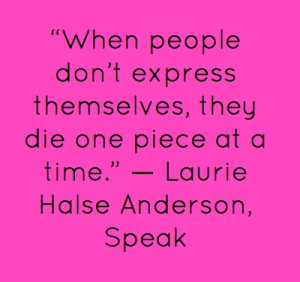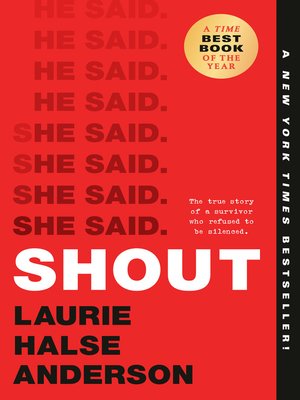
The collection progresses from childhood memories and experiences, to adolescent angst exacerbated by trauma, to empowered adulthood. SHOUT captures Anderson’s journey to find her voice and use it to empower other victims through the written word. Once Anderson “speaks,” a series of collective voices, possibly as many as a million, respond with stories of their own trauma. Somehow after the rape, Anderson is able to piece herself back together and find the voice necessary to tell her tale, albeit in a fictionalized version. Anderson’s Young Adult novel SPEAK is fictional but echoes the author’s real life traumatic ordeal. Anderson then segues into a jarring and premature coming of age experience foisted upon an adolescent girl raped the summer before high school. SHOUT opens with a family history plagued with trauma as Anderson describes her father’s PTSD after World War II.

She also reiterates the strength in solidarity, and emphasizes the idea that collective voice has great power to make change. This trauma often leaves the voiceless in its wake, but Anderson illuminates the ways in which victims can heal and find a new voice. Anderson weaves her way through the stark landscape of lives, particularly her own, that were riddled with violence and abuse. Yet the poem ends with possibility and promise: the birth of a baby on the side of the road during the liberation from Holocaust concentration camps. She starts the collection with “in the name of love,” a poem that opens with a jarring image of a violent death: a young man’s head sliced in two by a machine (7). In truth, it is a collection that lyrically describes the terrible tragedies that can render victims mute. Anderson begins the collection of poems with the declaration that the work is “the story of a girl who lost her voice and wrote herself a new one” (1). These are the voices of the survivors who reached out to Anderson after her publication of the novel SPEAK, the survivors to whom she dedicates her work SHOUT.



SHOUT by Laurie Halse Anderson is a poetic memoir written in response to the onslaught of voices unearthed by her work SPEAK. The following version of this book was used to create the guide: Halse Anderson, Laurie.


 0 kommentar(er)
0 kommentar(er)
